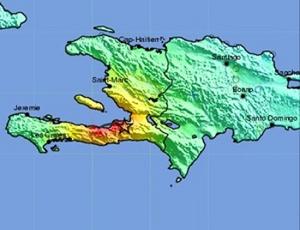Haiti's earthquake was long anticipated
A group of scientists from the United States and Jamaica warned in 2008 that a fault zone on the south side of the island — the Enriquillo-Plaintain Garden fault zone — presented a danger; they predicted that a magnitude-7.2 earthquake would result if all of the strain along the fault “is released in a single event”

Haiti's earthquake region // Source: USGS
A magnitude-7.0 earthquake struck Haiti yesterday afternoon local time, about sixteen kilometers south-west of the country’s capital, Port-au-Prince, and at a depth of ten kilometers. New Scientist’s Shanta Bartey reports that powerful aftershocks — 32 at the latest count — continue to affect the region.
A major earthquake in the region of Haiti was long overdue, CNN reports. In fact, a group of scientists from the United States and Jamaica warned in 2008 that a fault zone on the south side of the island — the Enriquillo-Plaintain Garden fault zone — presented a danger.
They predicted that a magnitude-7.2 earthquake would result if all of the strain along the fault “is released in a single event today,” according to the abstract the team presented at the 18th Caribbean Geological Conference.
The earthquake is the worst that has affected the Haiti region in two centuries and around 3 million people are likely to have been “severely shaken” by the earthquake, the BBC reports. A U.S. Geological Survey “shake map” pictured above shows the intensity and strength of ground shaking.
“Many buildings, including a hospital and the presidential palace in the capital Port-au-Prince, have collapsed, burying residents under the rubble,” according to the British Geological Survey’s web site.
The United Nations has issued a statement to say that its local headquarters in Haiti have “sustained serious damage along with other UN installations” and “a large number” of employees are unaccounted for, adds the BBC.
According to Paul Mann, who was one of the scientists who gave the warning, Haiti is particularly vulnerable to earthquake damage because many people live in poorly constructed housing on steep slopes. The largest earthquakes Haiti has experienced hit in 1751, 1770, 1842, 1860, and 1887, according to Mann’s 2005 book, Active Tectonics and Seismic Hazards of Puerto Rico, the Virgin Islands, and Offshore Areas.
The region has had its fair share of natural disasters: many are still homeless following the spate of hurricanes and storms that ravaged Haiti in 2008, killing 900, according to the London Times.
